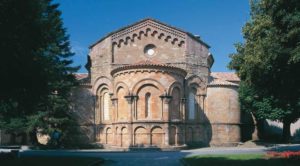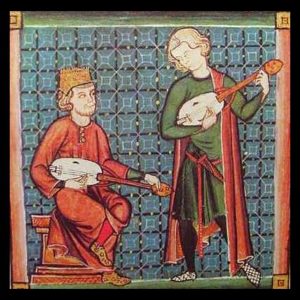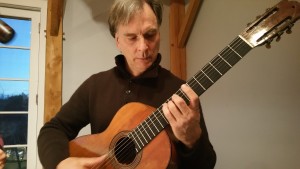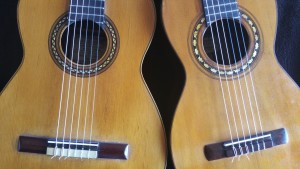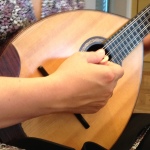Tuesday, November 29, 2016
OMAGGIO
NEW CD by FRANK WALLACE on GYRE
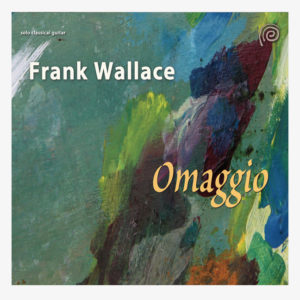 On January 6, 2017 Omaggio [Gyre CD 20212] will be released worldwide in digital formats. This 25th recording by American virtuoso guitarist Frank Wallace is now available in CD format at www.gyremusic.com. Featuring an extraordinary 1931 Hauser I guitar, the CD pays tribute to the legacy of Andrés Segovia and the incomparable German luthier Hermann Hauser. Works on this recording were written for Segovia or were part of his repertoire, and are homages themselves to Bach, Debussy, Tárrega, Llobet, and the ancient city of Santiago de Compostela. Wallace, “…a powerful player, possessed of an unfailing musicianship…an almost symphonic range of colors and articulations…” [Kunze, Soundboard], performs works of Villa-Lobos, de Falla, Tárrega, Turina, Mompou and his own piece dedicated to the Catalan composer/guitarist Miguel Llobet, Dreams on a Lullaby.
On January 6, 2017 Omaggio [Gyre CD 20212] will be released worldwide in digital formats. This 25th recording by American virtuoso guitarist Frank Wallace is now available in CD format at www.gyremusic.com. Featuring an extraordinary 1931 Hauser I guitar, the CD pays tribute to the legacy of Andrés Segovia and the incomparable German luthier Hermann Hauser. Works on this recording were written for Segovia or were part of his repertoire, and are homages themselves to Bach, Debussy, Tárrega, Llobet, and the ancient city of Santiago de Compostela. Wallace, “…a powerful player, possessed of an unfailing musicianship…an almost symphonic range of colors and articulations…” [Kunze, Soundboard], performs works of Villa-Lobos, de Falla, Tárrega, Turina, Mompou and his own piece dedicated to the Catalan composer/guitarist Miguel Llobet, Dreams on a Lullaby.
LISTEN TO SAMPLE TRACKS
Segovia first met Hauser in 1924, beginning a long and close relationship that led to the 1937 Hauser that Segovia played in concert for 25 years and which he proclaimed is “the greatest guitar of our epoch.” It is now housed at the Metropolitan Art Museum in New York City. The Hauser guitar on this recording was built for Segovia in 1931, but was soon passed on to his student Blanche Moyse, later known for her work with the Moyse Trio and as a founder of Marlboro Music. In Wallace’s own words: “These older guitars are vibrant musical powerhouses – their tones are infinitely more complex and haunting than those of newer guitars.” Wallace has long been a proponent of historical music and instruments. He has recorded and performed lute and vihuela music on authentic instruments, and on historic guitars by Panormo, Lacote, Gutierrez, Manuel Ramirez, Soto y Solares, Hauser, Bouchet, Fleta, etc.
Omaggio presents music that Segovia frequently played in concert, including several homages. Opening with the first three Preludes by Heitor Villa-Lobos, they are a Homage to the Brazilian sertanejo (county man), Homage to the carioca hustler, and Homage to Bach. Wallace moves on to what is considered by many the first great masterpiece of the 20th century, Omaggio (Homenaje) by Manuel de Falla. Written in 1920, it was composed for a collection of works entitled Tombeau de Claude Debussy. Next is Homenaje a Tárrega by Joaquín Turina composed in 1932 for Segovia. Written in a nationalistic musical style, it has distinct impressionistic influences. Wallace’s Dreams on a Lullaby is a set of variations on Noi de la Mare, a Catalan folk song made famous by Miguel Llobet’s iconic setting. The six-movement Suite Compostelana by Federico Mompou has special personal associations with the great pilgrimage site of Santiago de Compostela for both the composer and the performer. Mompou dedicated this work to Segovia in 1963 as homage to the great city itself as well as the festival presented there annually. The International University Courses Música en Compostela were created in 1958 on the initiative of Maestro Andrés Segovia, together with the Spanish diplomat José Miguel Ruiz Morales. Wallace attended the course in 1972 and met Ruiz Morales several years later which led to a performance at Música en Compostela by his Trio LiveOak in 1982.
Frank Wallace tours internationally as a soloist and with mezzo-soprano Nancy Knowles as Duo LiveOak. Robert Schulslaper of Fanfare dubbed him “…a true master of his instrument…His dynamic range is impressive, and his gradations of tone, constantly singing line, and sensitive musicianship confirm his ‘elegant virtuosity’ (classicstoday.com).” Bradford Werner on This is classical guitar says, “Frank Wallace plays his own works with inspiration, determination, and a wealth of creativity. With top notch playing and excellent compositions, this synthesis is a spectacular success. / …he can match the musicality of any player out there…”
One of the most prolific guitar composers of our time, Frank Wallace’s works have been called “contemporary musical emancipation” by NewMusicBox.org. A prizewinner in the 2013 José Fernández Rojas International Composition Competition in Logroño, Spain, he was also a 2015 recipient of the Ewing Arts Award. Tirelessly working to expand the guitar repertoire, Wallace founded and directed Festival 21 in Boston, a celebration of 21st century guitar music. In New York he founded and co-directed the Second Sundays Guitar Series run by the New York City Classical Guitar Society and the Roger Smith Hotel. He has taught at the New England Conservatory as well as various colleges and universities in New England and many summer workshops. Wallace is a graduate of the San Francisco Conservatory of Music, with a BM in guitar performance.
Complete program info, photos, videos and audio
Touring schedule
Compositions
For a review copy of the CD Omaggio, please contact wallacecomposer[@]gmail.com
Comments
Post Date
December 12, 2016
 OMAGGIO, a tribute to the legacy of Segovia with guitar by Hermann Hauser I, 1931
OMAGGIO, a tribute to the legacy of Segovia with guitar by Hermann Hauser I, 1931![]()

